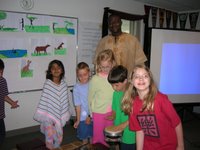One of the fun things that I get to do on a regular basis for my "other" job is present intercultural experiences to high school students. Basically, I work for AFS Intercultural Programs, a high school exchange organization. In order to recruit students to go abroad, I talk to them in their foreign language classes about culture, stereotypes and my time overseas.
Before Rabi had his work permit, he would join me on field trips and would present to classes about
We were also invited to present to my nephews' classes (1st and 3rd grades) in a
Now that he is working full time, he no longer comes on trips with me. But I'm still presenting about Burkina. In this way, I'm fulfilling the Peace Corps' 3rd goal which is "Helping promote a better understanding of other peoples on the part of Americans." Of course I present a bit about my study abroad experience in
During these presentations, I try to impress in these students the magnitude of
I talk about my experiences living with a host family during my training, and the fact that Muslims and Christians lived side by side in my host village. I do talk about the poverty but try to put it into perspective. I explain to them, just as Americans have stereotypes about Africans, the Burkinabes I knew had stereotypes of Americans. How many people did I talk to in Burkina that could not believe there are people living on the streets in the
So, I may be kidding myself that I am in some way making a difference. But if one kid leaves my presentation with a desire to learn or experience a new culture (be it through a high school exchange, college study abroad, or the Peace Corps), then I am jazzed about my work. And if they will one day recall that the capital of Burkina is



No comments:
Post a Comment